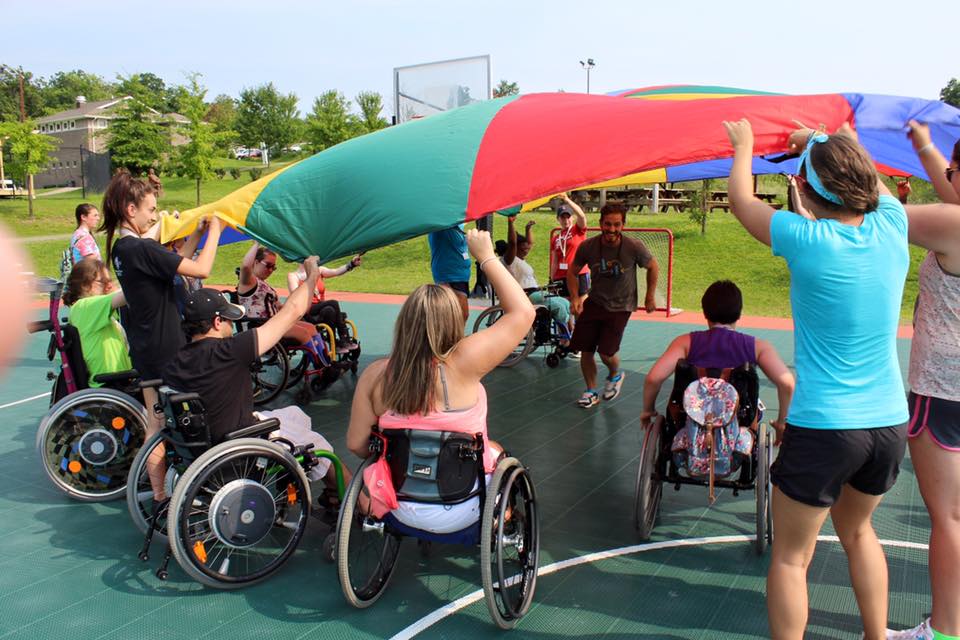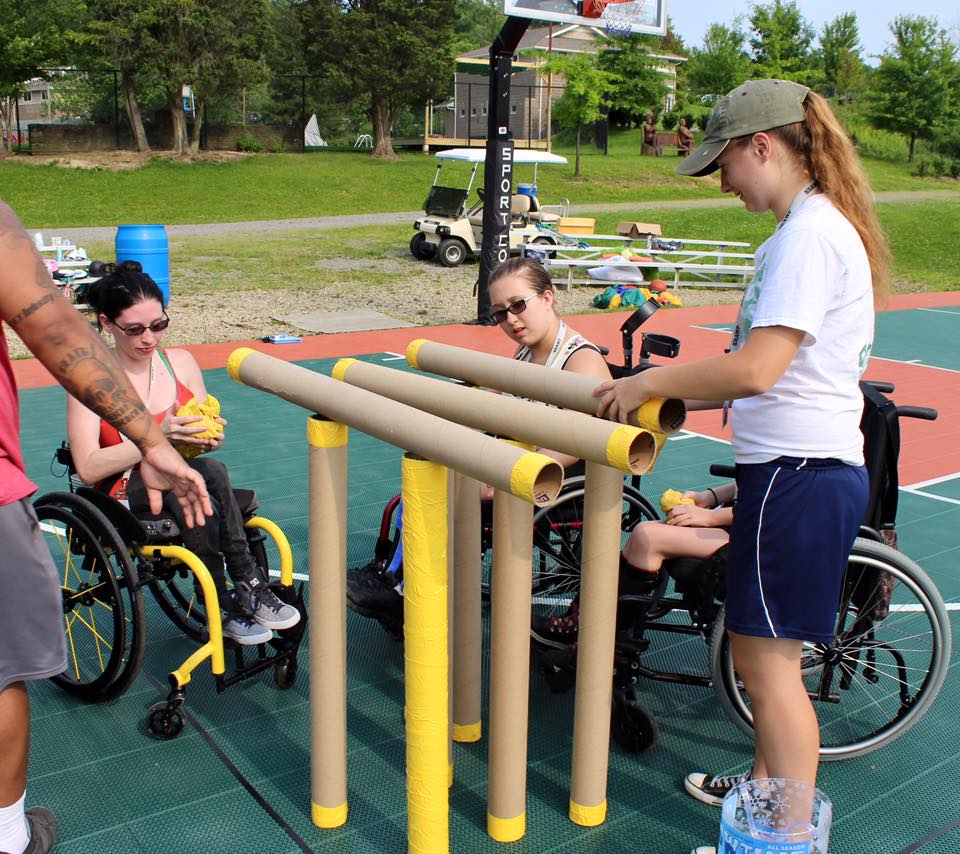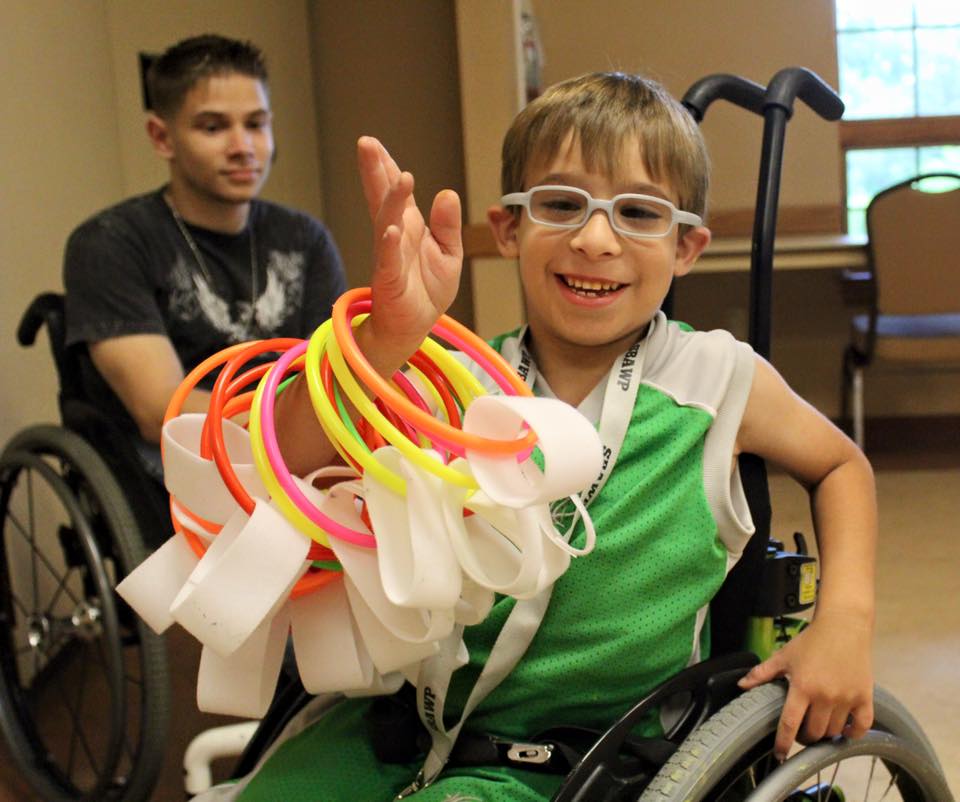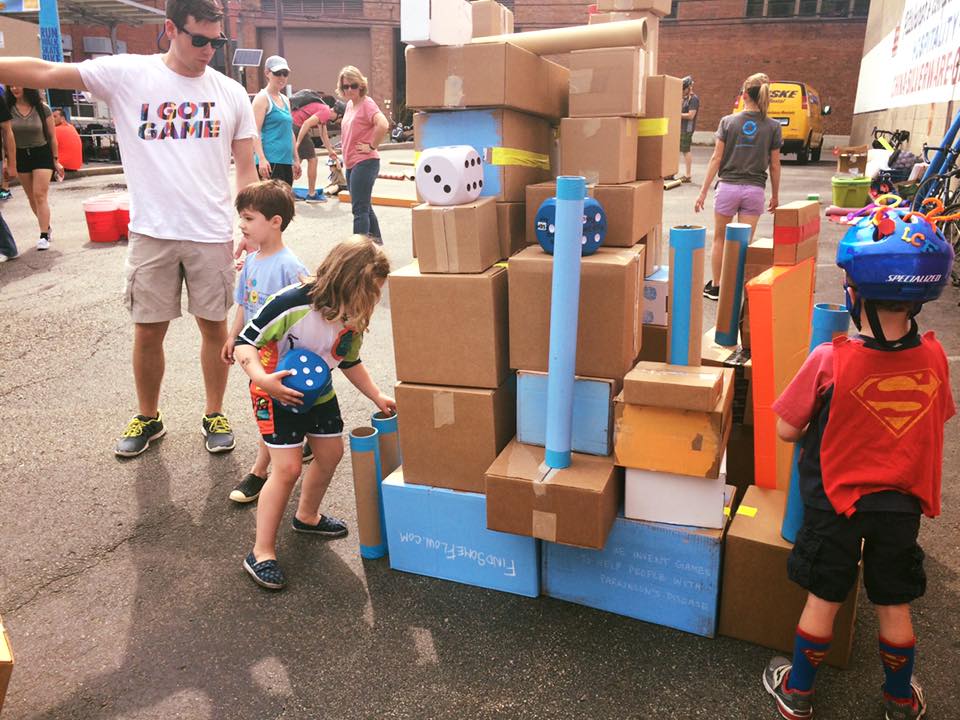“Do you want to play with me?”
“If communities take steps to facilitate this question and make it easy to ask, the world will be a better place. It’s not always easy for everyone to invite play. Imagine if it were.”
Ian Neumaier is the founder of Find Some Flow (FSF), a unique organisation that brings together communities and schools through inclusive sports for all. With these games, Ian successfully solves the segregation between disabled and abled people, promoting learning around health disabilities and challenging people’s perceptions of them.
Based on his own experiences, as well as those of his partner, Nicole, a brave survivor of sexual abuse, Ian started Find Some Flow. The IPF spoke to the 31-year-old to find out more about how his story led to the creation of this much-needed organisaton.
Tell us a bit about how you started Find Some Flow.
Although I have never identified as disabled, I have traumatic brain injuries, been diagnosed with depression, social anxiety disorder, and ADHD. I live with PTSD, having been exposed to repeated levels of violence. I’m familiar with the effects of stigma, isolation, and loneliness.
I’ve suffered the behavioural, academic and legal effects of living with these conditions without having proper identification, support, and therapy. These circumstances have empowered me with a level of empathy that fuels my work within the realm of ‘social justice’.
Find Some Flow is a natural extension of my passions. I’ve been an athletic trainer for 15 years [and] began teaching martial arts and boxing when I was 15. I enjoyed the challenge of connecting with people and teaching them; it taught me how to communicate with different people in different ways.
At some point I began using kinetic-games as training tools. I’d create games that forced athletes to use the movements that I wanted to train them in. For instance, a game I call “five-cone line tag” created a fantastic opportunity for athletes to practice cutting, transitioning from linear to lateral movements.
I was eventually asked to develop a fitness program for school children who were uninterested in standardised after-school sports. Half of the group identified as being on the autism spectrum. One morning I overheard a participant ask his father if he could take apart his old laptop. It dawned on me that these kids were “makers” – they liked to explore and create!
So instead of teaching them games, I helped them create their own games. Eventually, we were using games to work on things like personal space, identifying social cues, and group-speaking.
Participants were re-imagining things I had taught them with a new, playful perspective. Jumping from cone to cone became jumping over lava – and everyone in the class was participating with a newfound commitment and sense of ownership.
Using a playful perspective offers fantastic solutions. One of the participant’s fathers asked if I could develop games for his consumers at a local Parkinson’s foundation. I developed games that took into account the common symptoms of Parkinson’s, along with therapies that had been found to be effective in improving things like dexterity, walking gait and stability.
One game allowed a father with Parkinson’s to compete against his son again for the first time in 20 years… and win! He was ecstatic that he got to express his competitiveness and athleticism again.
Now I enjoy creating games that solve a problem.

Ian believes that it’s important to create games that include people of all kinds. [Image credit: Find Some Flow]
You mentioned that just having products that are “accessible and inclusive” isn’t enough. What do you mean by this?
For decades we’ve had accessible and inclusive spaces, events, and programmes. Yet, we’re still living with deeply systemic levels of structural and cultural bias, stigma, and segregation. Clearly it’s not enough.
Accessible and inclusive programmes exist without actually addressing social or structural inequalities. They often further engrain the charity that is so often perpetuated when folks who are and are not disabled are in inclusive settings. A programme can be inclusive and, at the same time, further ingrain interaction through the lens of charity by requiring that disabled participants have an abled partner.
An event can be fully accessible and, at the same time, maintain the power differential that exists between abled and disabled folks by requiring physically disabled folks to have certain seating and certain access times.
If every time we mix abled and disabled kids, the abled majority [are] labelled as the “provider of assistance”, while the disabled minority as the “individuals with special needs”, those abled kids have already been assigned a superior level of dominance and influence. The disabled kids have been forced to internalise a level of subordination and secondary influence. How can we ever expect an equitable conversation to occur between them?
A space, event, or programme that is “accessible” is just that – it is able to be accessed. I want events and spaces that are able to be accessed, as well as engaged with.
A space, event, or programme that’s “inclusive” is just that – it is willing to include you. I want programmes that allow for equal influence.
Instead of creating spaces with passive spectators, I want to create spaces that facilitate active influencers. Find Some Flow works within the realm of play; it is super easy to dismantle power differentials and facilitate truly integrative and equitable interactions through play.

Ian wants to develop games that allow for equal influence between the abled and disabled. [Image credit: Find Some Flow]
What is the process of creating your original inclusive games?
Game development is all about repeated failure and selection of the “least-failed” components. Much like art, it’s the process of game development that’s enlightening and therapeutic, not the final product.
With intergrative games, I start with a nice open space, playful people, and materials that are more accessible than others – items that are large, graspable, lightweight, and those that can be influenced by assistive pick-up tools. I develop lists on what each material can do – rolled, passed, stacked, thrown, colour coordinated, hidden, etc. Then we begin playing with them. At this point, the failure begins – it’s so fun!
I’ll start with an idea and it’ll fail, but there will be some good things that are discovered.
Service providers or educators come to me with a problem or a specific focus that they’re having trouble achieving with their audience. I develop programmes that enable participants to use game-development to accomplish things like identifying social cues, incorporating multiple perspectives to a problem, or start with a social action we want to work on.

Find Some Flow has worked with a number of young children in schools, enabling abled children to feel comfortable playing with disabled children and vice-versa. [Image credit: Find Some Flow]
What challenges has Find Some Flow faced and how did you tackle them?
Our greatest struggle is funding. Nicole and I have been administrating and facilitating Find Some Flow on our own time and dime. It’s very difficult. It’s not easy to invent new things or pursue new concepts when you have to decide between putting food in the refrigerator or paying a bill.
Thankfully, I think our tenacity has resulted in some public awareness and we should be in the sights of some foundations, who might be willing to support our work. We know what we are doing what needs to be done, we know that it’s work that is worth doing, and we aren’t afraid to suffer, fail, or sacrifice to achieve our goals.
The other challenge is my personality disorder. During particularly challenging weeks, I find it difficult to leave the house [and] phone calls are particularly difficult.
I’m also not a fan of chit-chat, small talk, or mingling. I don’t understand it, I don’t know how to do it and I avoid it. This presents a challenge when I’m responsible for fostering new relationships for Find Some Flow.
To work around this, I have meetings with individuals and small groups. I do just fine in these settings; I even enjoy them. I’m also comfortable speaking and presenting in front of groups, so when I have to introduce myself, I make sure I have a designated opportunity to speak to the entire group. After this, I don’t worry about small-talk because people either approach me with an interest – or they don’t. Problem solved.

Ian hopes that FSF can eventually create an atmosphere on playground where “Do you want to play with me?” is not a difficult question to ask. [Image credit: Find Some Flow]
What small changes can communities do to make play more accessible?
“Do you want to play with me?”
If communities take steps to facilitate this question and make it easy to ask, the world will be a better place. How is your community enabling residents to ask that question in a safe, supportive environment? It’s not always easy for everyone to invite play. Imagine if it were. Think hard about how to make it easy to ask that question. Once you explore that question, other accessibility and design solutions will follow.
Additionally, accessibility is not “for disabled people”. I want accessibility for me. There are thousands of ways that you can very quickly transition from being abled to being disabled.
In fact, if things go well and you live past the age of 75, you’re approaching a 75% likelihood that you will be disabled. It’s about creating stakeholders out of folks who see themselves as “unaffected” by disability, segregation and oppression. Community leaders need to learn from disabled folks and think deeply about the disabled experience; they need to project themselves into these experiences.
What are your plans for the future of Find Some Flow?
I hope to create employment opportunities for disabled folks; I’d love to pay people to assemble integrative game kits and deliver programmes. I also want to see Interactive Game Labs popping up in schools, universities and organisations, where students and teachers work together to up-cycle materials and explore game design, with community manufacturing producing equipment to enable intergrative play.
After playing together on the playground, I want children to ask teachers, “Where are my disabled friends and why can’t we go to school together?” I want to see how these students grow into advocates.
Finally, I want to identify a manufacturer who can help produce our intergrative game kit so we can sell them to groups who would like to purchase a durable version, instead of building on themselves, and use this to create sustainability for our free services.
“I want to identify and solve new problems, I want to challenge and disrupt new things. I’m not sure where Find Some Flow will lead me, but I think that it may be a stepping stone.”
To find out more about Find Some Flow’s work, visit their website, like them on Facebook and follow them on Twitter.

